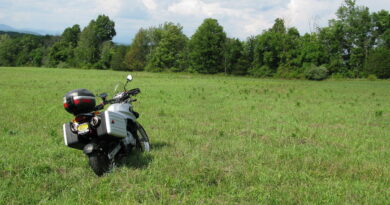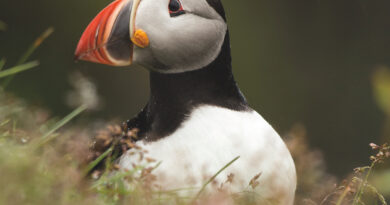My life as an adult beginner
Photos by Dustin Silvey
I haven’t always been an adult beginner. The fear of being bad at something—or worse, being perceived as bad—often kept me from trying new activities where I anticipated I could only be mediocre at best. When I occasionally tried to dabble in a new activity either through peer or familial pressure, the physical and emotional discomfort associated with being a beginner had me abandoning the activity just as quickly as I had started it. My Craigslist sales history has an “excellent-like new” Cannondale road bike to prove my point. There was safety in sticking to what I was already good at.
My approach to avoiding certain activities changed when I met my now husband, Dustin. Shortly after we started dating, Dustin invited me to join him on a run. I declined, and simply stated, “I can’t run.” I had tried running before, many of my friends ran and would encourage me to join. It was awful. Unlike my gazelle-like friends, my limbs were uncoordinated and heavy. My eyes watered, I wheezed and my complexion most often resembled a sun-blistered tomato. To me, my inability to run was just a simple fact. An inquisitive person, but also an ex-professional athlete who holds a PhD and is a professor of Sport Science, Dustin launched into a series of questions on my physical limitations and previous injuries that were impacting my ability to run. Unable to obtain a satisfactory response from me, and most obviously oblivious to the rules of modern dating, Dustin advised me: “it’s all in your head, you can run.”
With the neurochemical responses associated with the early stages of love overriding the ideals I held so tightly, I decided to try (again) to learn to run. The dopamine dump was no match for the awkward feelings associated with learning to run. Feeling defeated but albeit validated in my conclusion, I advised Dustin that running was not going to happen. Dustin was unperturbed: “It’s all in your head. You need to learn to be OK with being uncomfortable. The only way you’re going to learn to run, is by running.”

Regularly stepping outside of my comfort zone felt like a stage of life I had endured and thankfully passed through since becoming a senior executive who knew more or less what she was doing. I cared about my performance and subconsciously, what my performance said about my place in this world. The embarrassment associated with being a beginner took me straight outside my comfort zone. However, there was something in Dustin’s message I understood as I constantly belabored the point to young professionals I mentored: To get the title or the corner office they so often desired, they needed to do the work. That work often meant early days, late nights and sometimes little fun or enjoyment. Eventually, the hard work translates into opportunities, and opportunities translate into success. In my avoidance of activities for fear of mediocrity, I had forgotten that everyone is a beginner in everything until we are not. With that shift in perspective, my life as an adult beginner began.
I decided to try (once again) to learn to run. This time I let go of my expectation of myself as a runner and embraced my beginner status. I set realistic weekly running targets, and I ran. In doing the work, I learned how long some minutes can last, that I can sometimes walk faster than I can run, and mostly, I became comfortable with imperfection. The slow progress felt hard-won, and at some point running clicked—I was able to run 10 kilometres with ease. I had finally learnt to run!
With the realization that I was holding myself back all along, I was emboldened to try new activities. I went from never having camped or canoed to completing three multi-day canoe expeditions within the span of a year. I mountain-biked with pro riders in a world-class mountain biking destination. I even tried the indoor climbing gym, where I realized my fear of heights was not a fear I would easily overcome and that I didn’t have to succeed at everything new I tried. Looking back, I now see these activities were a rehearsal for the activity that took me farthest from my comfort zone: Riding a motorcycle.
Dustin and I, now married, decided to take a break from our busy professional lives to travel from our home in Vancouver, British Columbia to Ushuaia, Argentina. It is an ambitious trip but one that will allow us to travel slow and immerse ourselves in the various cultures and surroundings. One catch, Dustin wanted to travel by motorcycle. An experienced motorcyclist, Dustin suggested that I two-up, or if I was so inclined, I could learn to ride and take my own motorcycle. I had always wanted to learn to ride but never had the impetus to do it—so excuses be gone, I decided to learn to ride.

I went into learning to ride a motorcycle with my newly proven perspective as an adult beginner—it was going to be awkward and hard until it was not. I needed to stay confident, focused and try to have a little fun. However, my previous triumphs in this new era were no match for the challenges I experienced in learning to ride. I had met my match in the motorcycle, and I was right back to where I started, ready to abandon the activity just as quickly as I started it.
The motorcycle was a different beast from other activities. There was a lot for the adult beginner brain to master: two hands, two brakes, a clutch, speed, performance anxiety and other vehicles on the road. Like many new motorcyclists, I signed up for a certified street course. Since I had never ridden a motorcycle, nor even driven a standard vehicle, I asked Dustin to teach me the basics prior to the course. In an empty parking lot we started with clutch control, braking and slow-speed maneuvers. As I thought many of the course participants would be more experienced than I, and fearful of being the lone rider who holds up the group, I asked Dustin to take me into street traffic, and that’s where everything fell apart.
I kept messing up, and I mean messing up all the time. I stalled in the middle of a hill and couldn’t do a hill start. I constantly fumbled for the correct gear, causing the bike to lurch forward. I would drop the bike attempting U-turns. Everything that could go wrong went wrong. I was beaten down each time I got off the bike. I felt like I couldn’t trust myself to do the right thing. I was scared and frustrated, and I didn’t think I would ever learn to ride.
I had learnt to flex my resilience muscle by trying—and sometimes failing—at a relatively low-stake activity. Motorcycling is a high stakes activity, the risk is higher therefore, the obstacles felt larger to me. I was sucked right back into the hold of perfectionism by setting unrealistically high standards for myself, criticizing myself when I didn’t achieve those standards, and believing my performance said something about my place in this world. As per Michael Hyatt, “Perfectionism is the mother of procrastination,” and I procrastinated about getting back on the bike.
To complicate matters, every well-meaning person has an opinion on motorcycles and the type of person who should (or should not) ride. The weight of other people’s expectations and judgements on me as a motorcycle rider had me seriously questioning my decision to ride.

At this point, I was scheduled to start my certified street course. I didn’t want to go and I was ready to give up. I was stuck in my head again, right back at avoiding learning new skills for the fear of being bad at something. Dustin reminded me of the advice he gave me when I was learning to run: “You need to be OK with being uncomfortable on the bike. The only way you’re going to learn to ride is by riding.”
Then I did what I taught myself to do as an adult beginner: I went to my course and I rode! It was emotionally difficult and physically uncomfortable. I may have the unique status of the only person to cry multiple times during a motorcycle training course, but I kept showing up and I kept riding. I was the slowest rider in the group, and surprisingly, no one cared. I managed to complete the course with a perfect score on the Motor Skills Assessment, and nobody made suggestions that I should reconsider my life as a motorcyclist.
Right before the exam, feeling the pressure of the test, I once again questioned my ability to be a motorcycle rider. However, I took a deep breath and reminded myself to stay confident and focused and try to have a little fun. Much to my relief, after the exam, the examiner walked up and gave me a big thumbs up and said, “You passed!”
A few weeks later, I obtained my actual motorcycle license and had time to reflect that learning to ride a motorcycle has been one of the hardest things I’ve done in my adult life. But by allowing myself once again to be an adult beginner, I let go of the expectations of myself, my parents, friends and coworkers, of how I should or needed to act. My life changed beyond learning to ride a motorcycle; I have begun to reinvent myself—and now I’m in the driver’s seat for the adventure of a lifetime.
Janel and her husband, Dustin, are set to embark on a trans-Canadian shakedown journey on their BMW G 650 GS motorcycles before heading south to the ends of the Americas later this year. You can follow along on their Instagram account –Lost in Gear– and elsewhere on the internet.



